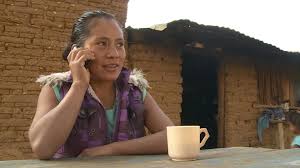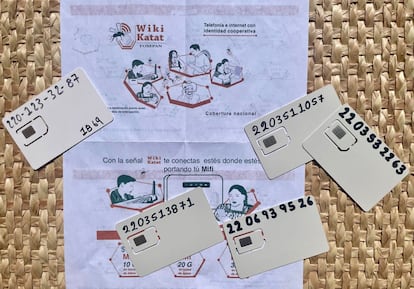The indigenous community that wants to provide mobile phone and internet service to all of Mexico

The Radio Tosepan Limakxtum group managed to reach an integration agreement and become the first mobile operator with a social focus.

In 2020, a Masewual Nahua group from the Sierra Norte of Puebla , members of the Tosepan Limakxtum radio station and the Tosepan Cooperative Union, installed a 2G network antenna in the community of Reyeshogpan. Two months later, Telcel (Mexico's largest mobile phone company) arrived in the area, offering the 4G network. Thus, the Indigenous community's project to provide telephone and internet service to the Sierra communities was halted, but only temporarily.
“We had to abandon the project, but we continue dreaming of having our own telephone system,” says Nicacia Lino de Jesús, one of the founders of Wiki Katat (which means “come, come” in Nahuatl), the first virtual social and community mobile operator in the country.
A year later, in 2021, this group approached Altán Redes, a Mexican telecommunications company that operates the shared 4.5G broadband network (and which will soon move to 5G). Although this company has the infrastructure, it is not allowed to reach the end consumer. With the advice of groups such as Redes AC (Networks for Diversity, Equity and Sustainability AC) and TIC AC (Community Indigenous Telecommunications AC), the Radio Tosepan Limakxtum group managed to reach an integration agreement to become the first mobile operator with a social focus and coverage in Mexico, but also in the United States and Canada. The company provides signal in both countries for up to a month when users travel there.
"Our plan is for the end user to benefit from good rates, but also for people who want to sell our data packages to keep 15% of the total from each recharge," says Bonifacio Iturbide Palomo, one of the founders of Wiki Katat and the radio station Tosepan Limakxtum.
A different model
In Wiki Katat's scheme, the benefits don't remain in the hands of one person. "It's a cooperative model that follows the values of Tosepan," describes Iturbide. Today, there are around 75 tapalewihkes, which also offer services in places like Puebla, Mexico City, Yucatán, Oaxaca, Veracruz, and Chihuahua, but one of their main centers is at CESDER (Center for Rural Development Studies AC), a nonprofit university that has been offering bachelor's degrees for 40 years to provide young people with development options in the northern Sierra of Puebla, so they are not forced to seek opportunities elsewhere.
In the experience of Sofía Medellín Urquiaga, coordinator of the Community Communications specialty at CESDER and a member of the center's tapalewihke collective, Wiki Katat's greatest value lies in its collective spirit: "Wiki's entire model is based on indigenous community values and practices. It's an alternative that breaks away from the conventional business model; we're not just enriching the same old people," she emphasizes. In the case of CESDER, 15% of each top-up goes toward activities and the purchase of equipment for communication students. "We provide our own telephone service and have helped establish 10 other tapalewihkes that are bringing the service to their communities in the Sierra and using the profits for their collectives."
Regarding Wiki's benefits, Miguel García Hernández, a graduate of the Sustainable Rural Processes program at CESDER and a Wiki user for two years, said what he liked most, besides its philosophy, was its affordable prices and the fact that he was able to keep his phone number. "Their 3G package for 130 pesos, which lasts a month, is very useful to me, unlike other options that expire after only 15 days," he says. But he also surprisingly realized that Wiki has better coverage in areas of the Sierra that the company with the most users in the country doesn't reach. Mexico has one of the most expensive broadband services in the world, according to the OECD.
The challenges
For Nicacia, the most difficult thing has been getting people to trust that a group of Nahua people is capable of providing quality mobile phone and internet service. “We're so wedded to these big companies that changing our mindset causes us a lot of questions. We've tried to make this change, not only in the phone's mindset, but also in our mentality. It's important to raise awareness that as a society, we can take charge not only of our economy but also of our telephone and communication systems.”
Bonifacio, for his part, shares that the project's goal is to make Wiki's prices the most affordable in a collaborative setting, emphasizing the fact that access to information and communication technologies is, above all, a right. In his opinion, Wiki users and providers, in addition to benefiting from more accessible alternatives, are promoting greater autonomy in access to telecommunications, as well as freer communication based on the ancestral knowledge of indigenous communities.
Ana Paula de la Torre Díaz, El Pais, Spain






